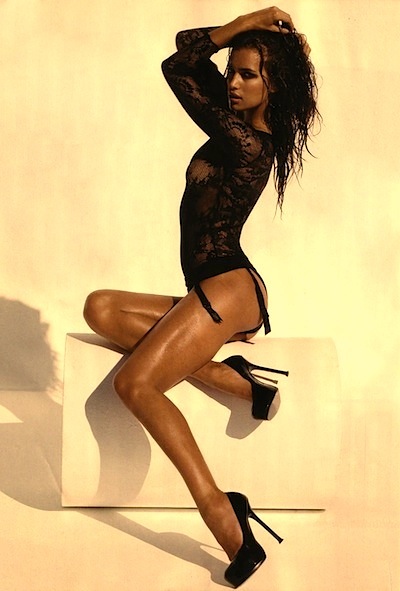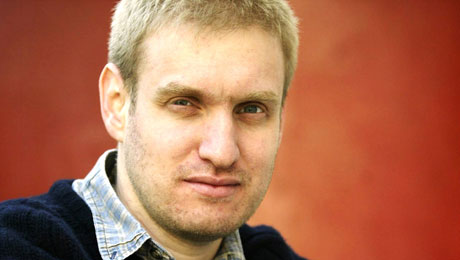By Jason Apuzzo. • The biggest news since our last Cold War Update! was the debut of the trailer (see above) for Apollo 18, produced by Timur Bekmambetov. I can’t say that I was all that impressed with it; the movie looks more or less like Paranormal Activity on the Moon, and otherwise far inferior even to what Michael Bay seems to be doing, re: Apollo missions in Transformers 3. The trailer looks cramped and claustrophobic, and plot-wise a bit too obvious in terms of where it’s going. None of the characters jumped out at me as being interesting – merely as victims in a standard-issue horror scenario.
Also: I don’t mind the ‘found-footage’ motif, but what bothers me here is that the filmmakers don’t seem to have actually nailed what Super 8 film looked like back in the day. Super 8 was generally grainier, but also (as I recall) had slightly deeper-than-usual color saturation. In any case, I’m a bit underwhelmed by what I’m seeing thus far with this film. Perhaps they need to find some piranhas on the Moon …
• Christopher Nolan has announced that after Batman 3, he essentially wants to do a hit-job biopic of Howard Hughes. That, at least, is the strong implication from this piece over at New York Magazine, which states that Nolan’s Hughes-pic “would focus on the freakier decades of Hughes remarkably secretive and OCD-addled life.”
This captures, in essence, what I dislike so much about Nolan. Howard Hughes was an extremely innovative, daring and ultimately tragic individual – and easily one of the most compelling American figures of the twentieth century. (He was also, incidentally, an ardent anti-communist and Cold Warrior.) Martin Scorsese’s biopic of Hughes, starring Leonardo DiCaprio, only lightly scratched the surface of Hughes’ accomplishments and refined allure – but I’m glad Scorsese at least got a crack at the material, because what Nolan is sure to give us is another of one his epics of adolescent derangement (The Dark Night, Inception, Memento, etc.) for which he’s becoming so famous.

What disgusts me here is that Hughes’ mental and emotional troubles later in life – which were likely genetic in nature, and beyond his control – were also ones that he went to great lengths to conceal, precisely in order to avoid this kind of exploitation. Like a graverobber, though, Nolan apparently can’t resist the temptation to plunder them – his new film project, incidentally, will be based at least partially on handwritten memoranda actually burglarized from Hughes’ office – and so now Nolan will drag us through the garbage pile of Hughes’ later life in order to make whatever trite points he has in mind. It’s ghoulish – but typical for Nolan.
• Olga Kurylenko has a spread in the current issue of the Russian Glamour. It’s pretty good, but I like this picture to the right better.
• According to Kiefer Sutherland, the 24 movie is still very much on – and Tony Scott is still apparently interested in doing it. They’re still waiting on a script, though. Scott, incidentally, has also been attached to the Top Gun sequel.
And speaking of Top Gun, writer Mark Harris in GQ is currently blaming Top Gun for ruining contemporary Hollywood cinema. Harris recycles the oldest cliche in the book: that the nefarious forces of Lucas, Spielberg and Bruckheimer have ruined Hollywood forever, when the industry should rightfully have been left to the likes of Hal Ashby and Mike Nichols. Harris – who reads like a kind of poor man’s Peter Biskind – also doles out more trendy, fanboy love to Christopher Nolan.
Memo to Mr. Harris: had the industry been left to the likes of Hal Ashby and Mike Nichols – admittedly fine filmmakers – Hollywood would’ve gone bankrupt, and we would still be shooting movies in Super 8. Sorry, but that’s how it is. Incidentally, if a genuinely innovative filmmaker like Hal Ashby came up nowadays, people like Harris would probably be the first to attack him.
• The makers of John Milius’ anti-North Korean Homefront video game recently talked to The Wall Street Journal. Here are some choice quotes from the WSJ piece:
Homefront is less about vilifying North Korea than about placing the player within an occupied America. The 1984 film “Red Dawn,” which Milius directed and co-wrote, was a key influence. In “Red Dawn,” a group of high schoolers form a guerrilla resistance against an invading Soviet Union and its allies. The uncanny image in the film of paratroopers landing in a school field, says Votypka, sums up the feeling Kaos has attempted to capture in Homefront—that of a gross violation of boundaries. Invasions are not supposed to happen on American soil, and as such must inspire a certain gut reaction in the player.
This is certainly true of Homefront’s opening minutes. The game begins with a dizzying pastiche of real and simulated news footage about foreign conflicts and the failing economy, blurring the line between fact and fiction. Secretary of State Hillary Clinton, speaking in a televised broadcast about last year’s North Korean torpedo that sank a South Korean ship, is the very first image. The rest of the video sequence concerns the game’s near-future setting and backstory but is hard to parse. What it does convey is a sense of urgency and imminent danger. When the player is subsequently given control as Robert Jacobs, standing in his home in occupied America, it isn’t long before Korean soldiers drag him out and onto a bus headed presumably for a prison camp.
Like a long establishing shot in a film, the bus ride sets the scene, but lets the player move the camera. Looking out the windows, one can see Korean guards battering young men in front of a playground, spot a large “Store Closing” sign, and watch Koreans gun down a young boy’s parents as he begins to sob. The reaction, of course, is anger on top of helplessness. “When you play most military shooters, you get the sense that there’s a war overseas somewhere, and the military commander has told you to go take these objectives,” says Votypka. “[This game is] less about trying to associate with some military character that you have very little in common with. Homefront is much more personal, because it’s about how you would react in this situation.”
Cool. Not to pick a bone with the WSJ writer, but actually the game rather obviously does seem to be about “vilifying” the North Korean regime – which is fine by me. The game certainly sounds intense, not to mention hard core in its depiction of our current antagonisms with Pyongyang. Homefront debuts March 15th.

• In other Cold War News & Notes: some footage has leaked of Leonardo DiCaprio filming Clint Eastwood’s Hoover biopic; January Jones is talking more about X-Men: First Class (see here and here); more images have leaked of Meryl Streep playing Margaret Thatcher; word comes that Kevin Spacey was almost set to play the villain in the new Bond film (nooo!); THR has a review up of the new documentary just premiered in Berlin about the Mikhail Khodorkovsky trial; THR also talks to the German director of the new Red Army Faction movie; the creators of Atlas Shrugged have released a clip from the film that looks like something out of Dallas; and Tyrese Gibson is saying that Transformers: Dark of the Moon is going to be the best movie of the series. I certainly hope so. Special Note: As I’ve previously reported in our Invasion Alerts!, producer James Cameron and director Shawn Levy are apparently going to be remaking Fantastic Voyage in 3D. I’ll be reporting on this periodically here in our Cold War Updates!, since the original Fantastic Voyage was, in fact, a Cold War thriller about America and the Soviet Union racing to create technologies that could miniaturize their militaries for transportation purposes (an odd idea, when you think about it). What Cameron will be doing with this premise, God only knows.
• AND IN TODAY’S MOST IMPORTANT NEWS … In a week in which Vlad Putin urged sexy Russian (not so) super spy Anna Chapman to run for the Russian Parliament – a great idea, in my opinion – you would think she would be our Cold War Pin-up … but not when Russian supermodel Irina Shayk gets the cover of the Sports Illustrated Swimsuit issue, my friends! Ms. Shayk talked to The Wall Street Journal this week, and revealed her ambitions to play “a Russian spy” in a movie; however, she also pouted that Vlad Putin hasn’t called her yet to congratulate her on the SI cover. Bummer!
Tempted as I was to use a picture from her SI photoshoot, I’ve decided to go with something a bit sultrier she did for South African GQ recently.
And that’s what’s happening today in The Cold War!
Posted on February 23rd, 2011 at 5:51pm.

